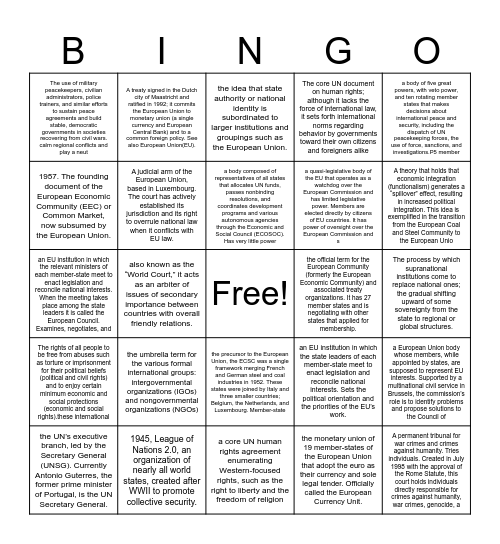

This bingo card has a free space and 24 words: the umbrella term for the various formal international groups: intergovernmental organizations (IGOs) and nongovernmental organizations (NGOs), 1945, League of Nations 2.0, an organization of nearly all world states, created after WWII to promote collective security., a body composed of representatives of all states that allocates UN funds, passes nonbinding resolutions, and coordinates development programs and various autonomous agencies through the Economic and Social Council (ECOSOC). Has very little power, the UN’s executive branch, led by the Secretary General (UNSG). Currently Antonio Guterres, the former prime minister of Portugal, is the UN Secretary General., a body of five great powers, with veto power, and ten rotating member states that makes decisions about international peace and security, including the dispatch of UN peacekeeping forces, the use of force, sanctions, and investigations.P5 member, The use of military peacekeepers, civilian administrators, police trainers, and similar efforts to sustain peace agreements and build stable, democratic governments in societies recovering from civil wars. calm regional conflicts and play a neut, 1957. The founding document of the European Economic Community (EEC) or Common Market, now subsumed by the European Union., A treaty signed in the Dutch city of Maastricht and ratified in 1992; it commits the European Union to monetary union (a single currency and European Central Bank) and to a common foreign policy. See also European Union(EU)., the official term for the European Community (formerly the European Economic Community) and associated treaty organizations. It has 27 member states and is negotiating with other states that applied for membership., the precursor to the European Union, the ECSC was a single framework merging French and German steel and coal industries in 1952. These states were joined by Italy and three smaller countries; Belgium, the Netherlands, and Luxembourg. Member-state, a quasi-legislative body of the EU that operates as a watchdog over the European Commission and has limited legislative power. Members are elected directly by citizens of EU countries. It has power of oversight over the European Commission and s, an EU institution in which the relevant ministers of each member-state meet to enact legislation and reconcile national interests. When the meeting takes place among the state leaders it is called the European Council. Examines, negotiates, and, an EU institution in which the state leaders of each member-state meet to enact legislation and reconcile national interests. Sets the political orientation and the priorities of the EU’s work., a European Union body whose members, while appointed by states, are supposed to represent EU interests. Supported by a multinational civil service in Brussels, the commission’s role is to identify problems and propose solutions to the Council of, A judicial arm of the European Union, based in Luxembourg. The court has actively established its jurisdiction and its right to overrule national law when it conflicts with EU law., the monetary union of 19 member-states of the European Union that adopt the euro as their currency and sole legal tender. Officially called the European Currency Unit., The process by which supranational institutions come to replace national ones; the gradual shifting upward of some sovereignty from the state to regional or global structures., the idea that state authority or national identity is subordinated to larger institutions and groupings such as the European Union., A theory that holds that economic integration (functionalism) generates a “spillover” effect, resulting in increased political integration. This idea is exemplified in the transition from the European Coal and Steel Community to the European Unio, also known as the “World Court,” it acts as an arbiter of issues of secondary importance between countries with overall friendly relations., A permanent tribunal for war crimes and crimes against humanity. Tries individuals. Created in July 1998 with the approval of the Rome Statute, this court holds individuals directly responsible for crimes against humanity, war crimes, genocide, a, The rights of all people to be free from abuses such as torture or imprisonment for their political beliefs (political and civil rights) and to enjoy certain minimum economic and social protections (economic and social rights).these international, The core UN document on human rights; although it lacks the force of international law, it sets forth international norms regarding behavior by governments toward their own citizens and foreigners alike and a core UN human rights agreement enumerating Western-focused rights, such as the right to liberty and the freedom of religion.
IOs, the UN, the EU, Intl' Law & Governance | Political Geography Vocab Bingo | 03. European Bingo Review | International Organizations | Humanitarian Intervention and R2P
Share this URL with your players:
For more control of your online game, create a clone of this card first.
Learn how to conduct a bingo game.
With players vying for a you'll have to call about __ items before someone wins. There's a __% chance that a lucky player would win after calling __ items.
Tip: If you want your game to last longer (on average), add more unique words/images to it.